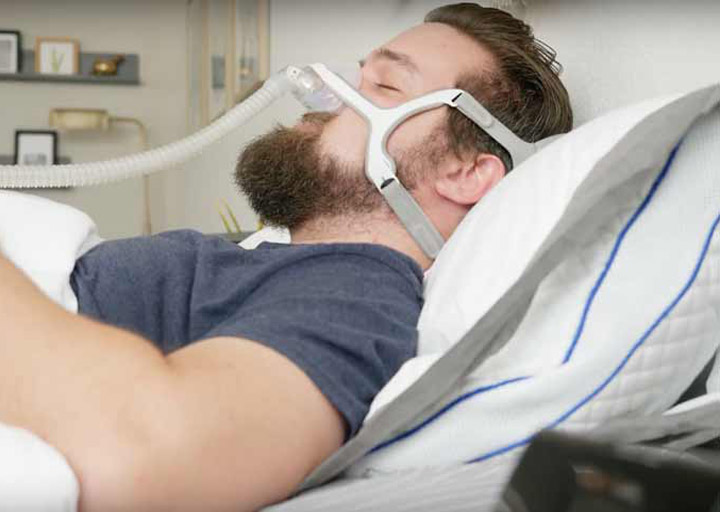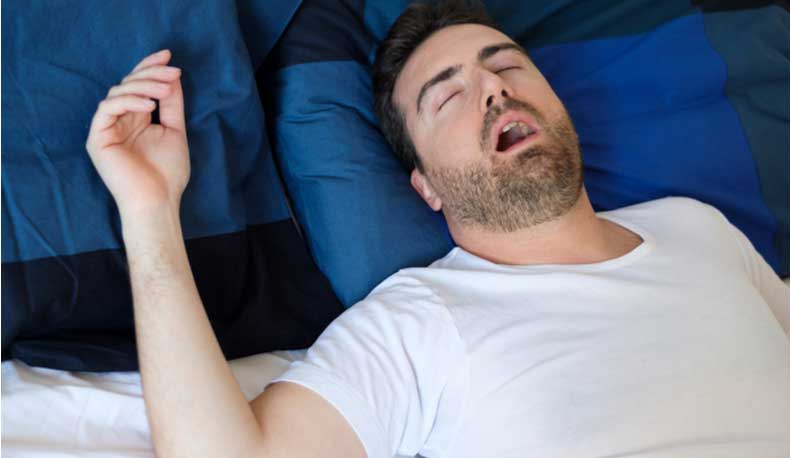In today’s fast-paced and demanding world, stress has become an omnipresent force that affects us in many different ways. And when stress impacts sleep, it can lead to a variety of issues.
Sleep disorders, such as sleep apnea, have gained increased attention due to their potential to disrupt the delicate balance of rest and rejuvenation our bodies require. But can stress cause sleep apnea? Let’s examine the findings.
What is Sleep Apnea?
Before we dive into the link between stress and sleep apnea, let’s explore what sleep apnea is. While there are many different types of sleep apnea, they are characterized by the same thing—breathing stops during sleep, which wakes the person up. The tricky thing with this occurrence is that most people don’t even realize what has woken them up, which leaves many people with sleep apnea to go undiagnosed for years.

Types of Sleep Apnea
There are three main types of sleep apnea that people suffer from, including Obstructive Sleep Apnea (OSA), Central Sleep Apnea (CSA), and Complex Sleep Apnea Syndrome (CompSAS).
Obstructive Sleep Apnea
OSA is caused by the muscle in the back of the throat collapsing during sleep, which narrows the airway and cuts off oxygen intake. As soon as the brain picks up that the sleeper is no longer breathing, it wakes them up. This is one of the more common types of sleep apnea.
Central Sleep Apnea
CSA is caused by the brain sending incorrect signals to the body to control breathing. This can cause pauses in the breathing cycle, slower breathing or incorrect gas exchange. When breathing stops for long enough, it will cause the sleeper to wake up, often unaware of what woke them.
Complex Sleep Apnea Syndrome
CompSAS refers to a condition in which the sleeper suffers from both OSA and CSA.
How Sleep Apnea Severity is Measured
Sleep apnea is measured using an apnea-hypopnea index (AHI). Those who suffer from mild sleep apnea will get a number between five and 15 on the AHI, which means they wake up that many times per night.

Individuals who suffer from moderate sleep apnea sit within the 15-30 range on the AHI. Severe sleep apnea is considered to be anywhere above 30 on the AHI, with most severe sleep apnea cases averaging about 47.
The Link Between Stress and Sleep Apnea
People with sleep apnea are more likely to deal with mental health disorders such as PTSD, anxiety, depression and bipolar disorder. Stress and anxiety can also make sleep apnea symptoms worse, but there is currently no conclusive evidence that stress causes sleep apnea.
RELATED: Anxiety and Sleep Guide
Treating Stress and Sleep Apnea
While there is no direct link between stress and sleep apnea, we know that stress causes increased levels of adrenaline and cortisol, which can disrupt your sleep cycles. So whether or not you suffer from sleep apnea, reducing stress can help you to achieve a higher quality of sleep. These are some ways you can improve your stress levels and reduce sleep apnea:
- Meditate – There is an undeniable link between meditation and sleep. Studies suggest that there is a 95% increase in the quality of sleep of those who practice mindfulness meditation.
- Schedule time to worry – Sound counterproductive? Scheduling time to worry is a practice used in Cognitive Behavioral Therapy and is helpful for two main reasons. First of all, you don’t have to worry all day long because you can leave all your worries for the allocated time. Additionally, focusing your mind on the problems at hand for a dedicated period of time can actually help you to come up with solutions, which increases the chances of the problems going away.
- Limit alcohol and caffeine – Studies show that both caffeine and alcohol can impact your ability to get high-quality sleep and can put more stress on the body. By reducing or cutting out caffeine and alcohol, you could greatly improve your quality of sleep.
- Journal – Journaling is another mindfulness practice that lets you put all your worries down on paper, essentially getting them off your chest. While journaling, you can also practice gratitude which helps to reduce feelings of stress as you focus on what you appreciate about your life.
If your sleep apnea symptoms increase and cause excessive daytime sleepiness, insomnia or chronic loud snoring, then it may be time to consult a doctor for a more aggressive treatment plan. This could include:
- Conservative treatments such as weight loss, sleeping aids, nasal spray or reviewing current medications that could cause sleep apnea
- Adaptive ventilation devices
- Sleeping mouthpiece
- Nerve stimulators
- Medication for Central Sleep Apnea
- Surgery
FAQs
Can reducing stress help sleep apnea?
There is no conclusive evidence that supports the fact that stress causes sleep apnea. That being said, stress does cause increased levels of cortisol and adrenaline, which have an impact on your sleep cycle.
Does sleep apnea happen every night?
Most people sleep apnea deal with the disorder every night. However, some people with mild forms of sleep apnea may only experience it occasionally.
Does elevating your head help with sleep apnea?
If you suffer from Obstructive Sleep Apnea, elevating your head can help keep your airways open during the night, preventing sleep disturbances caused by sleep apnea.
Can sleep apnea be triggered by stress?
There is no conclusive evidence that suggests that stress causes sleep apnea. However, stress can cause disrupted sleep cycles which can make existing sleep apnea symptoms worse.

